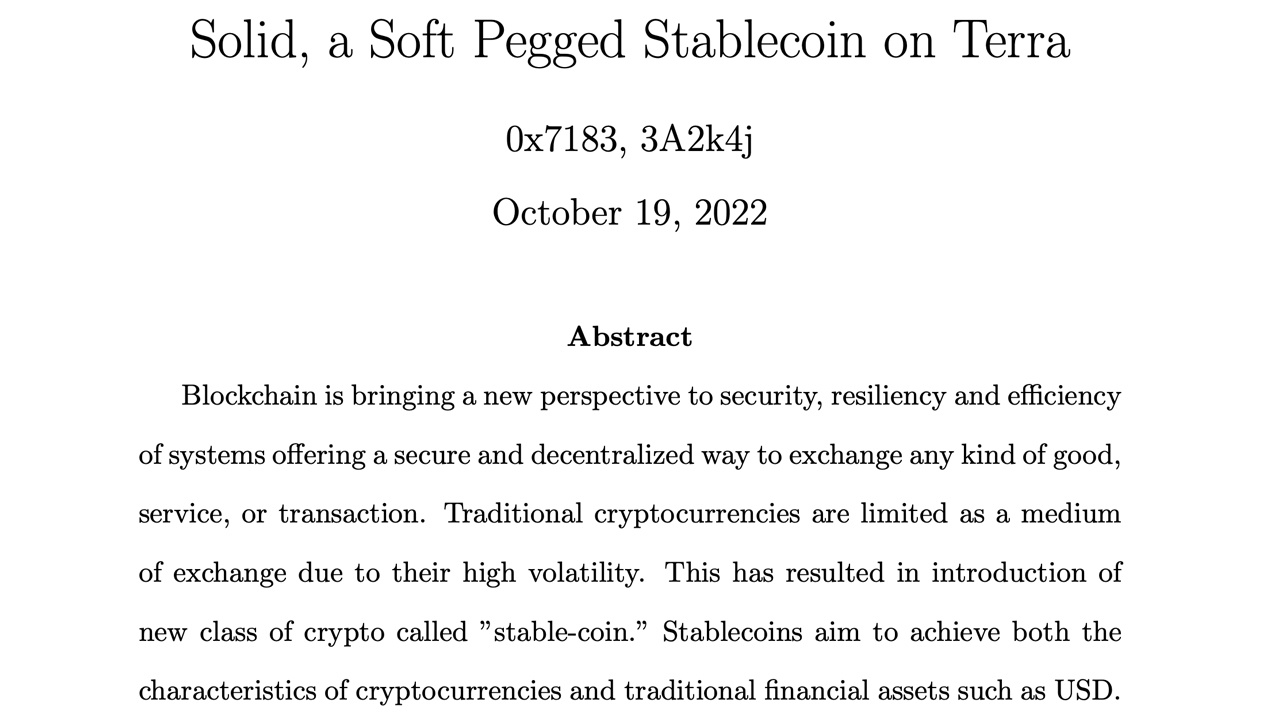Following the Great UST Collapse, a Defi Project Plans to Launch a ‘Soft-Pegged Stablecoin’ Built on Terra – Bitcoin News
(Originally posted on : Bitcoin News )
Following the Terra stablecoin collapse last May, the Terra blockchain ecosystem has another stablecoin concept in the works called “Solid.” The stablecoin Solid and its white paper were revealed by a decentralized finance (defi) project, Capapult Finance, and the idea has been dubbed a “soft-pegged stablecoin” built on Terra.
Terra Blockchain Ecosystem to See a New Stablecoin Called Solid
Roughly five months ago, the crypto community experienced some dark days when the stablecoin terrausd (UST), now called terraclassicusd (USTC), depegged from its $1 parity. Today, USTC is changing hands for $0.03 per unit and the obliterated Terra blockchain ecosystem moved to a new network called the Phoenix blockchain.
With the Terra 2.0 network launch, the crypto community was introduced to a new native crypto called terra (LUNA) 2.0. Following the stablecoin depegging incident, which wreaked havoc across the entire crypto economy, a defi project called Capapult Finance says it plans to launch a new “soft-pegged stablecoin” built on top of the Terra network called “Solid.” The stablecoin concept was revealed in a white paper called “Solid, a Soft-Pegged Stablecoin on Terra.”

The project’s white paper describes Solid as an “over-collateralized and fully decentralized soft-pegged stablecoin on Terra.” Unlike the original Terra blockchain white paper co-authored by Do Kwon, the authors of the Solid white paper are represented by the six alpha-numeric digits of two addresses — “0x7183, 3A2k4j.”
The white paper published on Oct. 19, 2022, stresses that there’s a need for stable assets in the world of defi, but fiat-backed stablecoins don’t cut it, according to the white paper’s authors. “Fiat-backed stablecoins are not in the owners’ control, as was showcased by the Tornado Cash ban,” the white paper notes. The stablecoin’s paper, hosted on the Capapult Finance website, adds:
Thus, to make blockchain technology more common there needs to be an asset with minimal volatility, one that is as decentralized as possible. It is becoming more obvious each and every day that decentralized money needs a decentralized stablecoin.
The paper says Solid will be minted using a collateralized debt position (CDP) scheme similar to Makerdao, and users deposit interest-earning collateral and borrow the stablecoin. The mechanism also works alongside Capapult Finance’s governance token CAPA, and the project claims to “bring honesty and trust to Web3, join us in our journey to a fully decentralized ecosystem.”
Solidus or Solid claims to offer low volatility and stability via the interest-earning collateral held on the Capapult protocol. As far as the Capapult protocol’s website is concerned, the site says the application is “coming soon.” At the time of writing, the entire stablecoin economy is valued at $146.44 billion and the top two stablecoins (USDT & USDC) are fiat-backed crypto assets. Two projects within the stablecoin economy that leverage a CDP method, or over-collateralized scheme, include Makerdao’s DAI and Tron’s USDD.
It’s worth noting that a number of crypto supporters believe the onset of the harsh crypto winter was fueled by Terra’s demise. Some of the accusations directed at Terraform Labs executives like Do Kwon, and failed projects like the defi lending platform Anchor, have further tainted the community’s trust in the Terra ecosystem.
While the Capapult Finance website promises the project will bring “honesty and trust to Web3,” it will be interesting to see if the crypto community trusts a stablecoin built on a fractured blockchain ecosystem like Terra.
What do you think about the soft-pegged stablecoin idea that the defi project Capapult Finance says it plans to launch? Let us know what you think about this subject in the comments section below.
Image Credits: Shutterstock, Pixabay, Wiki Commons
Disclaimer: This article is for informational purposes only. It is not a direct offer or solicitation of an offer to buy or sell, or a recommendation or endorsement of any products, services, or companies. Bitcoin.com does not provide investment, tax, legal, or accounting advice. Neither the company nor the author is responsible, directly or indirectly, for any damage or loss caused or alleged to be caused by or in connection with the use of or reliance on any content, goods or services mentioned in this article.







 Bitcoin
Bitcoin  Ethereum
Ethereum  Tether
Tether  XRP
XRP  USDC
USDC  Solana
Solana  TRON
TRON  Figure Heloc
Figure Heloc  Lido Staked Ether
Lido Staked Ether  Dogecoin
Dogecoin  WhiteBIT Coin
WhiteBIT Coin  USDS
USDS  Cardano
Cardano  Bitcoin Cash
Bitcoin Cash  LEO Token
LEO Token  Wrapped stETH
Wrapped stETH  Hyperliquid
Hyperliquid  Monero
Monero  Wrapped Bitcoin
Wrapped Bitcoin  Chainlink
Chainlink  Binance Bridged USDT (BNB Smart Chain)
Binance Bridged USDT (BNB Smart Chain)  Ethena USDe
Ethena USDe  Canton
Canton  Stellar
Stellar  USD1
USD1  Wrapped eETH
Wrapped eETH  Rain
Rain  Litecoin
Litecoin  sUSDS
sUSDS  Dai
Dai  Hedera
Hedera  PayPal USD
PayPal USD  Coinbase Wrapped BTC
Coinbase Wrapped BTC  Avalanche
Avalanche  Zcash
Zcash  Sui
Sui  WETH
WETH  Shiba Inu
Shiba Inu  Toncoin
Toncoin  Cronos
Cronos  USDT0
USDT0  Tether Gold
Tether Gold  World Liberty Financial
World Liberty Financial  Polkadot
Polkadot  PAX Gold
PAX Gold  Uniswap
Uniswap  MemeCore
MemeCore  Mantle
Mantle  Ethena Staked USDe
Ethena Staked USDe  BlackRock USD Institutional Digital Liquidity Fund
BlackRock USD Institutional Digital Liquidity Fund  Circle USYC
Circle USYC  NEAR Protocol
NEAR Protocol  Global Dollar
Global Dollar  Falcon USD
Falcon USD  Bittensor
Bittensor  Aster
Aster  Aave
Aave  Pi Network
Pi Network  Sky
Sky  OKB
OKB  syrupUSDC
syrupUSDC  Ripple USD
Ripple USD  Bitget Token
Bitget Token  HTX DAO
HTX DAO  Pepe
Pepe  Internet Computer
Internet Computer  BFUSD
BFUSD  Ethereum Classic
Ethereum Classic  Ondo
Ondo  Superstate Short Duration U.S. Government Securities Fund (USTB)
Superstate Short Duration U.S. Government Securities Fund (USTB)  Gate
Gate  Worldcoin
Worldcoin  Pump.fun
Pump.fun  POL (ex-MATIC)
POL (ex-MATIC)  KuCoin
KuCoin  Jupiter Perpetuals Liquidity Provider Token
Jupiter Perpetuals Liquidity Provider Token  Midnight
Midnight  Ondo US Dollar Yield
Ondo US Dollar Yield  Ethena
Ethena  Cosmos Hub
Cosmos Hub  Jito Staked SOL
Jito Staked SOL  NEXO
NEXO  USDtb
USDtb  Binance-Peg WETH
Binance-Peg WETH  Spiko EU T-Bills Money Market Fund
Spiko EU T-Bills Money Market Fund  Rocket Pool ETH
Rocket Pool ETH  Aptos
Aptos  Official Trump
Official Trump  Binance Bridged USDC (BNB Smart Chain)
Binance Bridged USDC (BNB Smart Chain)  Algorand
Algorand  Wrapped BNB
Wrapped BNB  Filecoin
Filecoin  Function FBTC
Function FBTC